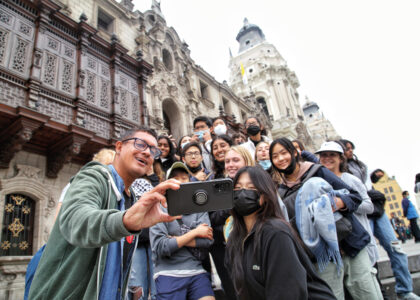Selecting the right study abroad program is a crucial decision that can significantly impact your academic and career trajectory. With countless options available, it can be overwhelming to decide which program aligns best with your major, personal interests, and professional goals. To help you navigate this process, we’ve compiled essential tips to ensure you make an informed choice that will enhance your education and set the stage for future success.

Understanding Your Academic and Career Goals
The first step in choosing a study abroad program is to clearly define your academic and career goals. Consider what you hope to achieve during your time abroad. Are you looking to gain specific knowledge in your field of study, improve your language skills, or develop a global perspective that will benefit your future career? Understanding these goals will help you narrow down the options and select a program that offers the right courses, research opportunities, and extracurricular activities.
For example, if you’re pursuing a degree in international relations, a program based in a politically active region might offer invaluable insights and firsthand experiences. Conversely, a science major might seek out programs that provide access to advanced laboratories or unique ecosystems. By aligning your program choice with your academic needs, you’ll ensure that your time abroad is both productive and relevant to your major.

Researching University Study Abroad Programs
Many universities offer a variety of university study abroad programs that are designed to complement different majors and academic paths. These programs often have established partnerships with foreign institutions, ensuring that the credits you earn abroad will transfer back to your home university. When researching these programs, consider the curriculum, the faculty involved, and the resources available to students.
It’s also important to look into the location of the program. Some students thrive in bustling cities with vibrant cultures, while others may prefer the quiet of a small town or the unique challenges of a remote environment. Consider whether the program offers opportunities for internships, research projects, or community engagement, as these experiences can provide valuable skills and connections that will benefit you in your career.
For those looking to explore diverse cultures and languages, education abroad programs in Latin America, for instance, can offer unique insights into the social and economic dynamics of the region. These programs can be particularly enriching for students studying fields such as sociology, economics, or public health. To learn more about what students can gain from education abroad in Latin America, check out our guide on studying abroad in Peru.

Evaluating Program Flexibility and Customization Options
Another key factor to consider is the flexibility of the study abroad program. Some programs are highly structured, with a set curriculum and predetermined activities. While these can be beneficial for ensuring that you stay on track academically, they might not offer the freedom to explore topics or regions that are of particular interest to you.
If you have specific academic or professional goals that aren’t fully addressed by traditional programs, consider looking into custom trips. Customizable programs allow you to tailor your study abroad experience to better suit your needs, whether that means focusing on a particular area of study, engaging in independent research, or combining multiple interests into one cohesive program. Educators and students can design these custom trips by collaborating with program advisors to create an itinerary that meets their specific objectives. To explore custom options, feel free to contact us and discuss your unique needs.

Financial Considerations and Scholarships
Finances are often a major concern when it comes to studying abroad. While some programs may seem out of reach due to cost, it’s important to thoroughly research financial aid options. Many universities offer scholarships and grants specifically for study-abroad students. Additionally, some programs might be more affordable due to lower living costs in certain countries, or because they include housing, meals, and transportation in the program fee.
When comparing costs, consider not only the tuition but also the cost of living in the host country, travel expenses, and any additional fees for excursions or activities. Also, think about the potential return on investment—how will this experience enhance your education and career prospects? Sometimes a higher upfront cost is justified if the program offers unique opportunities that align closely with your academic and career goals.
Considering Cultural and Language Opportunities
One of the greatest benefits of studying abroad is the opportunity to immerse yourself in a new culture and possibly learn a new language. When choosing a study abroad program, think about how the cultural and linguistic aspects of the destination will contribute to your education. For instance, if you’re studying a foreign language, choosing a program in a country where that language is spoken will provide invaluable practice and immersion.
Cultural immersion is also key for students in majors like anthropology, history, or art. Living in a country that is rich in historical sites or artistic traditions can provide insights that are impossible to gain from textbooks alone. Moreover, experiencing a different way of life can broaden your perspective, making you more adaptable and culturally aware—traits that are highly valued in today’s globalized job market.
Programs located in countries with diverse ecosystems or unique social structures can also be incredibly beneficial for students studying environmental science, sociology, or political science. These programs offer direct engagement with the subject matter, allowing you to observe and analyze real-world issues in their natural context. For example, Engaged Education offers programs in various global locations that provide these kinds of immersive experiences. You can learn more about these opportunities by visiting Engaged Education’s location offerings.
Leveraging Your Study Abroad Experience
Once you’ve selected and completed your study abroad program, it’s crucial to leverage this experience in your academic and professional pursuits. Be sure to highlight the skills and knowledge you gained on your resume and in interviews. Employers and graduate schools value the global perspective and adaptability that come with studying abroad. You can emphasize your ability to navigate new environments, work with diverse groups of people, and apply classroom knowledge to real-world situations.
Additionally, the connections you make during your study abroad program can be invaluable for your future career. Whether it’s building relationships with professors, meeting professionals in your field, or collaborating with peers from around the world, these networks can provide support and opportunities long after you return home.
Engaged Education - Transformative Educational Travel Experiences
Choosing the right study abroad program is a decision that can shape your academic journey and future career. By carefully considering your goals, researching university programs, evaluating customization options, and taking financial and cultural factors into account, you can select a program that aligns with your major and sets you on a path to success.
Are you ready to find the perfect study abroad program for your major? Explore our range of customizable travel options to create an experience that aligns with your academic and career goals. Contact us today to learn more about how we can help you design the ideal custom trip, or download our brochure for more information on our transformative educational travel experiences.







